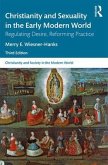Throughout the early modern period, scientific debate and governmental action became increasingly preoccupied with the environment, generating discussion across Europe and the wider world as to how to improve land and climate for human benefit. This discourse eventually promoted the reconsideration of long-held beliefs about the role of climate in upholding the social order, driving economies and affecting public health.
Governing the Environment in the Early Modern World explores the relationship between cultural perceptions of the environment and practical attempts at environmental regulation and change between 1500 and 1800. Taking a cultural and intellectual approach to early modern environmental governance, this edited collection combines an interpretative perspective with new insights into a period largely unfamiliar to environmental historians. Using a rich and multifaceted narrative, this book offers an understanding as to how efforts to enhance productive aspects of the environment were both led by and contributed to new conceptualisations of the role of 'nature' in human society.
This book offers a cultural and intellectual approach to early modern environmental history and will be of special interest to environmental, cultural and intellectual historians, as well as anyone with an interest in the culture and politics of environmental governance.
Governing the Environment in the Early Modern World explores the relationship between cultural perceptions of the environment and practical attempts at environmental regulation and change between 1500 and 1800. Taking a cultural and intellectual approach to early modern environmental governance, this edited collection combines an interpretative perspective with new insights into a period largely unfamiliar to environmental historians. Using a rich and multifaceted narrative, this book offers an understanding as to how efforts to enhance productive aspects of the environment were both led by and contributed to new conceptualisations of the role of 'nature' in human society.
This book offers a cultural and intellectual approach to early modern environmental history and will be of special interest to environmental, cultural and intellectual historians, as well as anyone with an interest in the culture and politics of environmental governance.
Governing the Environment presents us with diverse and innovative scholarship on how early modern thinkers interpreted the complex relationships between people and their dynamic environments. Although focused on the past, this well-crafted volume provides fresh perspectives on current interrogations into what constitutes "nature" in light of the long history of politicized climate knowledge, the variable effects of human agency, and the challenges of environmental governance projects.
Mary Floyd-Wilson, University of North Carolina
With learning lightly worn, these insightful essays illuminate the multiple, and ever-evolving, understandings of climate and the environment circulating in Western Europe and North America in the early modern centuries. They convincingly show how deeply environmental ideas, and management practices, were embedded in prevailing political and social orders - then as now.
John McNeill, Georgetown University
Mary Floyd-Wilson, University of North Carolina
With learning lightly worn, these insightful essays illuminate the multiple, and ever-evolving, understandings of climate and the environment circulating in Western Europe and North America in the early modern centuries. They convincingly show how deeply environmental ideas, and management practices, were embedded in prevailing political and social orders - then as now.
John McNeill, Georgetown University








